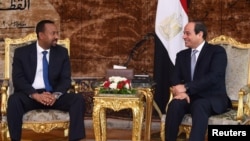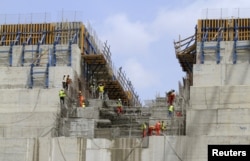The leaders of Egypt and Ethiopia say they have made progress in their talks on sharing the waters of the Nile River.
The two countries have been trying for months to settle a dispute over the dam Addis Ababa is building on the Nile River that Cairo fears will threaten its water supplies.
Ethiopia's Grand Ethiopian Renaissance Dam, estimated to cost at least $4 billion, will be Africa's largest hydroelectric dam.
Ethiopian Prime Minister Abiy Ahmed assured Cairo on Sunday the dam would not reduce Egypt's share of Nile waters.
Addis Ababa has "no desire or idea to harm the Egyptian people. We believe that we should benefit from this river, the Nile, but when we benefit we should not do harm to the Egyptian people,'' Ahmed said Sunday at a news conference alongside Egyptian President Abdel-Fattah el-Sissi in Cairo.
"We will take care of the Nile and we will preserve your share," Ahmed said.
The three nations most dependent on the Nile — Egypt, Sudan and Ethiopia — have been holding negotiations for months on the shared use of the water after the massive dam is built.
Egypt has been particularly concerned that the dam, which is being built on the river's main tributary, will divert too much water and place pressure on its fresh drinking-water supply, agriculture and industry.
Under a decades-old agreement, Egypt has received what neighboring countries perceive as more than its fair share of the water.
Past Egyptian leaders have threatened military action if there was any attempt to dam the Nile. El-Sissi has ruled that out.
But, at the end of the news conference, he asked for a stronger assurance. He asked Ahmed to swear to God that he would not hurt Egypt's share of the water.
"I swear to God, we will never harm you," Ahmed repeated the words in Arabic after el-Sissi.






